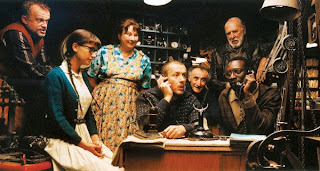Ah, the London Film Festival, a chance to star-spot (Steven Soderbergh and, er... Nigel Havers) and to feel smug because you’ve seen a movie about a fortnight before your friends get a chance. A few titles tickle my postmodern bone, as they turn in on the film-making process, and ultimately themselves.

Johan Grimonprez’s
Double Take comes from the Adam Curtis school of using archive footage, smartly juxtaposed with talking heads. Alfred Hitchcock finds himself introducing not his TV show in the 1950s and 60s, but broadcasters and politicians nervously assessing the Soviets' lead in the space race, and Nixon’s ‘kitchen debate’ with Krushchev. Via a plot borrowed from Borges, the focus shifts to Hitchcock himself, and a weird encounter that may or may not have occurred during the filming of
The Birds. We never forget we’re watching a movie, as we’re shown Hitchcock’s body double and vocal impersonator getting into their stride; were Dick and Nikita playing their parts as well?
 L'Enfer d'Henri-Georges Clouzot
L'Enfer d'Henri-Georges Clouzot appears to be a more straightforward proposition. It’s a documentary about the efforts of Clouzot (best known for The Wages of Fear and Les Diaboliques) to make a movie about paranoia and jealousy within an apparently happy marriage. The 1964 shoot was a catalogue of disasters: Clouzot didn’t get on with the female lead, Romy Schneider; his habit of waking up his colleagues in the middle of the night with new ideas alienated the technicians; the fact that the artificial lake that was central to the story was due to be drained 20 days after shooting started only added to the pressures. Things got so bad that the leading man, Serge Reggiani, walked away from the film; his replacement lasted a matter of hours; and then while he was filming a Sapphic dream sequence on a boat, Clouzot suffered a coronary, and the whole project was put on ice. The film was eventually made by Claude Chabrol, 30 years later.
The inevitable comparison is with
Lost in La Mancha, about Terry Gilliam's doomed attempt to film the Don Quixote story. But the footage here has added resonance, because many involved in the project – including Schneider, Reggiani and Clouzot himself – are dead, adding an extra layer of poignancy to the sense of missed opportunities. And, great as my regard is for Gilliam, he never used blue lipstick as shorthand for a dream sequence, did he?
Jean-Pierre Jeunet’s comeback,
Micmacs, is less obviously *about* film, although there are numerous nods and winks: the hero Bazil (Dany Boon) is seen mouthing along to the (French dubbed) soundtrack of The Big Sleep; a security guard does an excruciating De Niro impression; there’s a neat reference to Jeunet’s own Delicatessen, and even to Micmacs itself (via film posters).

But there’s also an implicit reproach to modern Hollywood. Micmacs is essentially a warped superhero movie, in which a band of outsiders pool their talents (contortionism; arithmetic; making stuff out of junk) for the common good. They’re not really freaks; but, because this is Jeunet, they look far uglier – far more like us – than the ravishingly beautiful mutants of the X-Men franchise.
Micmacs is essentially the story of how Bazil, who lost his father to a landmine, and very nearly his own life to a bullet, takes revenge on the rival arms manufacturers he holds responsible. The immediate comparison is with another comic book adaptation, Iron Man, which essentially comes down to a final battle between a good arms dealer and a bad arms dealer (see Chris Morris’s
Good & Bad AIDS sketch); whereas Jeunet damns them both. Which may be politically naïve (think Boy George’s
analysis of military malfeasance) but does make for better cinema.





























